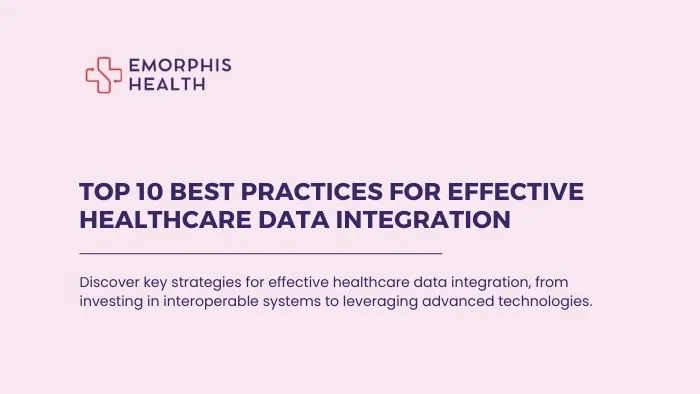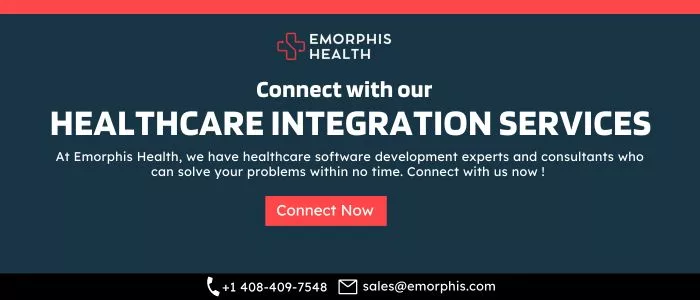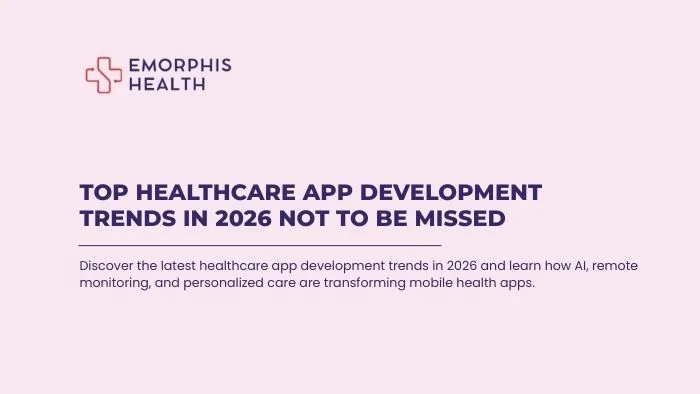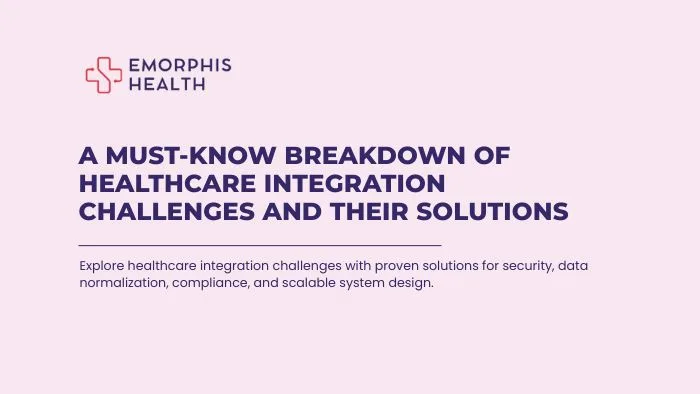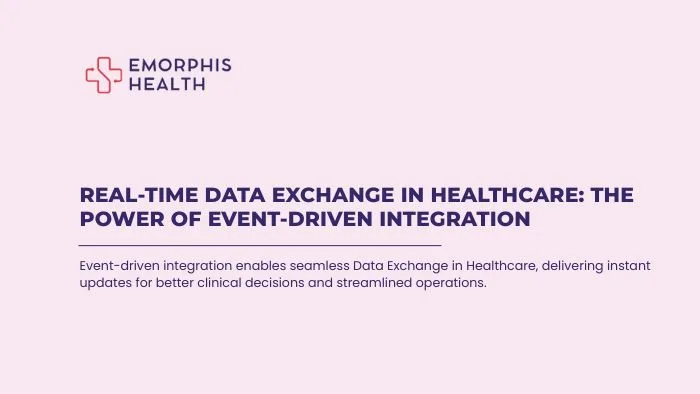Overview
See Contents
- 1 Overview
- 2 Understanding Healthcare Data Integration
- 3 The Benefits of Healthcare Data Integration
- 4 Challenges in Healthcare Data Integration
- 5 Healthcare Data Integration Market Insights: Trends and Projections
- 6 Top Ten Best Practices for Effective Healthcare Data Integration
- 7 The Future of Healthcare Data Integration
- 8 Conclusion
In the whirlwind of today’s healthcare revolution, healthcare data integration is like the superhero of the digital realm, swooping in to save the day with high-quality patient care and operational wizardry. Imagine it as the ultimate data matchmaker, effortlessly connecting the dots between diverse systems and data sources. This ensures that healthcare providers aren’t just flying blind but have a crystal-clear, up-to-the-minute view of patient info. Buckle up as we dive into the world of healthcare data integration, uncovering why it’s so crucial, what hurdles it faces, and how to master the art of seamless implementation.
Understanding Healthcare Data Integration
Healthcare data integration, also known as data harmonization or data unification, is the process of consolidating data from disparate sources into a unified system. This integration facilitates the smooth exchange of information between electronic health records (EHRs), laboratory systems, imaging systems, and other health information systems. Furthermore, it allows for a more holistic view of patient information, enhancing decision-making and care coordination.
The Benefits of Healthcare Data Integration
One of the primary advantages of healthcare data integration is the improvement in patient care. By integrating data from various sources, healthcare providers can access a comprehensive patient history, which enables more accurate diagnoses and personalized treatment plans. Moreover, healthcare data integration helps in reducing medical errors and duplicative testing, ultimately leading to better patient outcomes.
Additionally, healthcare data integration contributes to operational efficiency. Integrated systems streamline workflows, reduce administrative burdens, and enhance communication among healthcare professionals. In fact, organizations that have embraced healthcare data integration often experience significant improvements in productivity and cost savings.
Challenges in Healthcare Data Integration
Despite its numerous benefits, healthcare data integration comes with its share of challenges. One of the primary obstacles is dealing with legacy systems that may not be compatible with modern integration technologies. Furthermore, ensuring data privacy and security is critical, as sensitive patient information must be protected against unauthorized access and breaches.
Data quality is another challenge in healthcare data integration. Inconsistent data formats, incomplete records, and errors can hinder the effectiveness of integration efforts. Therefore, it is essential to implement robust data governance practices to maintain the accuracy and reliability of integrated data.
Healthcare Data Integration Market Insights: Trends and Projections
The global healthcare data integration market is experiencing significant growth as the industry embraces digital transformation and enhanced patient care solutions. According to a recent report from Grand View Research, several key details highlight the expanding landscape and driving factors behind this evolution.
Market Size and Growth
Furthermore, the healthcare data integration market is anticipated to grow at a robust compound annual growth rate (CAGR) of 14.5% from 2023 to 2030. By the end of this forecast period, the market is expected to reach USD 3.11 billion. This remarkable growth trajectory highlights the rising importance of data integration in healthcare and the continuous advancements in technology driving this expansion.
Regional Market Dynamics
In terms of regional performance, North America emerged as the dominant player in the healthcare data integration market, holding a substantial share of 38.8% in 2022. This significant market share is attributed to the region’s advanced adoption of digital health technologies, including Electronic Health Records (EHRs), Clinical Decision Support Systems (CDSSs), and telemedicine solutions. The North American market’s leadership underscores the region’s commitment to integrating data systems for improved healthcare delivery and patient outcomes.
Driving Factors
Several factors are fueling the growth of the healthcare data integration market. Key drivers include:
- Growing Demand for Digital Transformation: The increasing push for digital transformation in healthcare is accelerating the need for integrated data systems. Organizations are investing in technologies that streamline data workflows and improve operational efficiency.
- EHR Adoption: The widespread adoption of Electronic Health Records (EHRs) necessitates robust data integration solutions to ensure that patient information is accurately and efficiently shared across different systems.
- Data-Driven Decision Making: Healthcare providers are increasingly relying on data-driven insights to make informed decisions. Integrated data systems support this by providing comprehensive and real-time information, leading to better patient care and outcomes.
- Improved Patient Care: The primary goal of healthcare data integration is to enhance patient care. By consolidating data from various sources, healthcare professionals can access a complete patient history, resulting in more accurate diagnoses and personalized treatment plans.
In summary, the healthcare data integration market is on a dynamic growth path, driven by technological advancements, regional leadership, and a focus on improving patient care. As the market continues to expand, the role of integrated data systems will become increasingly pivotal in shaping the future of healthcare.


Top Ten Best Practices for Effective Healthcare Data Integration
Navigating the complexities of healthcare data integration requires a strategic approach. To overcome challenges and achieve seamless integration, organizations should consider the following best practices:
1. Invest in Interoperable Systems
Choose systems that support standard protocols and data formats to facilitate smoother integration and data exchange. For example, interoperable EHR systems can enhance healthcare data integration across different platforms, ensuring that patient data flows effortlessly between systems.
2. Implement Data Governance
Establish comprehensive data governance policies to maintain data accuracy, consistency, and security. This includes regular data quality assessments, enforcing data entry standards, and adhering to privacy regulations such as HIPAA. Effective data governance acts as a safeguard, ensuring that integrated data remains reliable and compliant.
3. Leverage Advanced Technologies
Embrace technologies like cloud-based solutions and AI to streamline healthcare data integration processes. Cloud solutions offer scalability and flexibility, while AI enhances data analysis and decision-making capabilities. These technologies can help handle vast amounts of data and provide valuable insights for better patient care.
4. Foster Collaboration
Promote collaboration among healthcare providers, IT professionals, and stakeholders. Effective communication and teamwork are essential for addressing integration challenges and ensuring that goals are met. Regular meetings and feedback loops can help align efforts and resolve issues swiftly.
5. Prioritize Data Security
Ensure robust security measures are in place to protect sensitive patient information. Implement encryption, access controls, and regular security audits to safeguard data against breaches and unauthorized access. A strong focus on security builds trust and ensures compliance with regulatory standards.
6. Adopt a Modular Approach
Use modular integration solutions that allow for gradual implementation and scalability. This approach helps manage complexity and adapt to evolving needs without overhauling existing systems. It also enables incremental improvements and reduces disruptions to daily operations.
7. Focus on User Training
Invest in training for healthcare staff and IT teams to ensure they are proficient in using integrated systems. Proper training helps users navigate new technologies effectively and minimizes the risk of errors during data entry and retrieval.
8. Monitor and Evaluate Performance
Continuously monitor the performance of integrated systems and evaluate their impact on operations. Use performance metrics to identify areas for improvement and make necessary adjustments to optimize the integration process.
9. Incorporate Feedback Loops
Establish mechanisms for collecting and addressing feedback from end-users. This helps identify practical issues and areas for enhancement, ensuring that the integration process remains user-centric and effective.
10. Plan for Future Upgrades
Stay informed about emerging technologies and industry trends that could impact healthcare data integration. Planning for future upgrades and maintaining a flexible integration strategy allows organizations to adapt to technological advancements and evolving healthcare needs.
By following these best practices, organizations can navigate the complexities of healthcare data integration with greater ease, ensuring that they achieve improved operational efficiency and enhanced patient care.
The Future of Healthcare Data Integration
Looking ahead, healthcare data integration is poised to play an even more significant role in the evolution of healthcare. Emerging technologies such as blockchain and advanced analytics will further enhance integration capabilities, providing even greater insights and efficiencies.
Furthermore, as healthcare continues to embrace value-based care, the need for comprehensive data integration will become increasingly critical.
Conclusion
In conclusion, healthcare data integration is a vital component in modernizing healthcare systems and improving patient care. By understanding its benefits, addressing its challenges, and following best practices, healthcare organizations can unlock the full potential of integrated data systems. As the industry continues to evolve, embracing healthcare data integration will be essential for achieving operational excellence and delivering superior patient outcomes.
Ready to take your healthcare data integration to the next level? Connect with Emorphis Health experts today! Our team is dedicated to guiding you through the complexities of integrating diverse data systems and optimizing your healthcare operations. Whether you’re looking to enhance patient care, streamline workflows, or leverage cutting-edge technologies, we’re here to provide personalized solutions tailored to your needs.
Don’t navigate this journey alone—reach out to our experts and let us help you achieve seamless, effective data integration. Contact us now to start transforming your healthcare data management.

